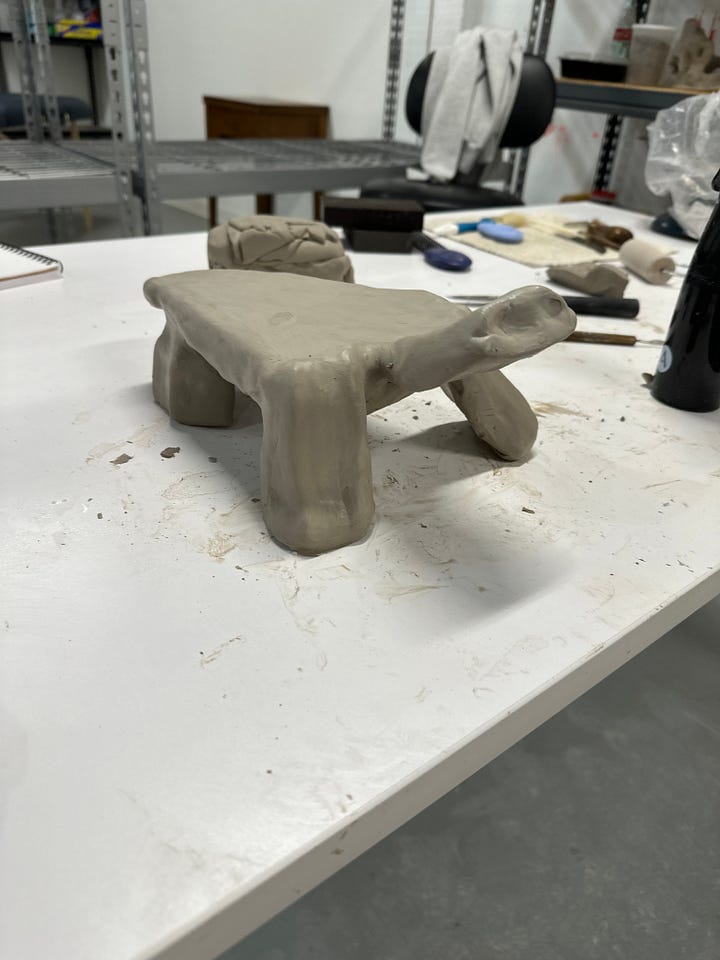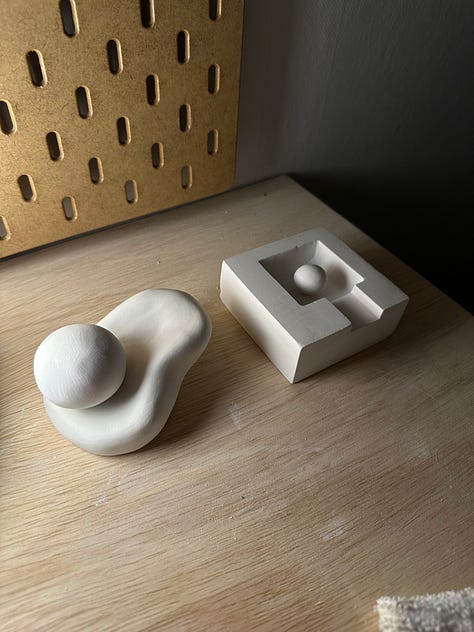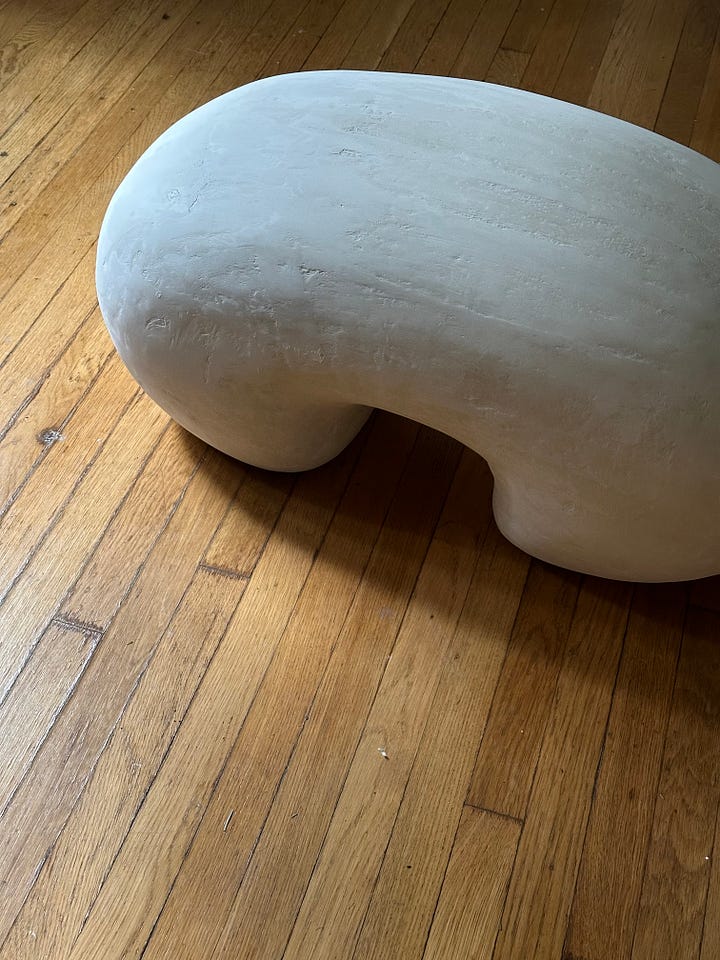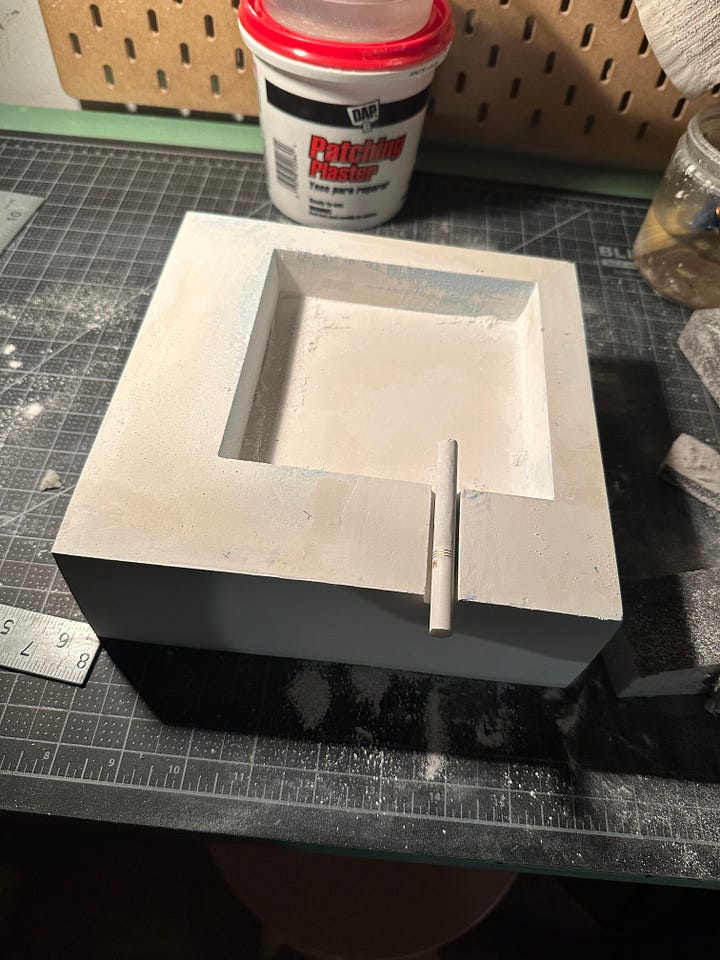Tortoise Christ of Latter-Day Talents
by way of a new and better beginning: something old, new, borrowed and blue.
For the past year or so, I’ve been working on a rather different set of creative pursuits, the practices of which are entirely different and wholely removed from those I until recently considered my vocation and around which I had fashioned most of my ambitions. I’ve been quite a few things and have nursed a number of talents over the course of my adolescent and adult life.
Singing was probably the first thing I was ever best at. I remember the pastor’s son remarking once at a youth church event that “everyone thinks they’re good at singing until they plug their ears.” Previously convinced that I myself was good at singing, and feeling freshly and acutely skeptical, I went home that night and plugged my ears and sang, probably to the Sinatra 2-disc “Best Of” I’d gotten for either my 16th or 17th birthday (I was also listening to a lot of Seal and Dean Martin at the time, but I’m sure I went back to the Chairman of the Board for grounding).
Fortunately, with this there were no disappointing revelations. Still, I wasn’t quite as good as I believed myself to be, and for the next several months, years really, I would sit on the floor next to my oldest brother’s receiver and 5-CD player (I’d inherited his room and his stereo when he went off to college) and would sing the same songs over and over until I had satisfactorily mimicked the original. I didn’t know that my mom had her own routine of quietly approaching the other side of my closed door and listening in, but both of routines eventually converged on the strongly encouraged—one might say forced—opportunity to sing a solo at the same church where my pastor’s son had caused me so much existential, creative anxiety.
I’d already done some singing as a boy in the First Presbyterian youth choir where my godmother was the organist and choir director, but this had always happened in groups or in plays—also forced opportunities—that caused me so much personal embarrassment and self-consciousness that the few intervening years were enough to severe, to my mind, the continuity between that talent’s earlier exhibitions and this new one. I don’t remember what I sang in church at 17, but I sang for the Sunday congregation at least once more—“Bridge Over Troubled Water” (something more secular but open to the generously religious interpretation of my fellow Presbyterians).
Why I’ve offered this extended anecdote is unclear even to me; though perhaps I mean to say that we don’t get to choose whatever it is that we’re good at, and we certainly don’t have much of a say as to when, where, or how our talents are put on display. At 17, let alone at 8 or 9 (or at whichever age it was that I played Moses’ brother Adam, and later Jesus himself—I had to carry a small wooden ladder as if it were a cross on which I was about to be crucified), I was woefully unprepared to accept with confidence such an invitation. My voice trembled uncontrollably, then and at nearly every other opportunity in the ten years that followed, and I dare say the unreadiness condemned the talent entirely.
Around the same age, and through much of my time as an undergrad, I was also an amateur poet. But while my work certainly improved beyond the frequently bathetic things that the youngest and most naive tend to write, I never considered poetry to be a legitimate profession; so, I took a much more lucrative path and went off to the Peace Corps. The career in international development didn’t materialize, and I wrote less and less poetry until I didn’t write any at all. In the realm of talents, “use it or lose it” is the cardinal rule. In other words, accept the invite or cease deserving it.
Again, I’ve found myself giving an anecdote the reason for which is as opaque as it is increasingly morbid—and not at all what I set out to write, which is really only about a small blue ceramic turtle.


Living by invitation is magical thing, and in my humblest opinion, one of the surest signs of synchronicity, that one is on the right path, or one of them. Contrary to the typical feeling of undeserving with which their receipt is accompanied, invitations have to be earned.
Once, as I interviewed him for a high school documentary project, my grandfather told me that he had never in his life applied for a job. I told someone this a few days ago, as it has recently taken on new meaning. Of course, he was born in 1927, and things were different, but I like to think, now at least, that it was his presence of mind—which seemed to always manifest as a irreproachable and exquisitely comforting charm—that garnered the invitations he was extended: be a joy to work with, and you will never be without a job, competence and experience notwithstanding.
We are always interviewing for the next thing, whether it be a job or a moment. Factor in the quantum possibility of retrocausality—some people, indeed some moments, “take a chance on” us—and this becomes true in each in direction. We all eventually deserve what we’ve already been given, even if the facts of what we’ve received change without our strict observation. If you don’t understand this, that’s okay; this is about a blue turtle, after all.
But enough preamble! Back to those practices in which I have been more recently engaged—and through which I am currently attempting to conjure for myself, and as my own personal alchemist, new invitations since the forsaking of my last one nearly two years ago.
It started with a Christmas gift, a disco-tiled hotdog, that turned out quite good. Good enough to spark the enthusiasm that my therapist might have labeled a symptom of what she lacked the official certification to diagnose as Bipolar Disorder. By mania or something else, I made eight more, improving them as I went along: terracotta air-dry clay became a denser white version that shrank less when it dried, new tools were acquired to help with shaping and placing tiles, I started using grout to prevent tile loss. And I made more things, little scultpures, studies, Platonic forms in their barest manifestations, curves without end, near-perfect lines that required hours of fine and fastidious sanding.
Having already done The Artist’s Way the year before, I was prepared to face the reality that my past creative pursuits were more reactionary than I had previously considered, and while this didn’t push me entirely through the grief that accompanies the burial of one’s own dying passions—some of them never die, of course, but still they retire indeterminately and return unrecognizable—it lubricated the reception of new ones. To my surprise, and having never been capable of rendering in two dimensions any idea from my mind, I discovered my knack for shaping the imagined and the unimagined in three, albeit with some limitation.





Like this latter-emerged talent, the turtle materialized circuitously. In the several hours before, I had been working on a cube, attempting to achieve perfect right angles and straight edges with only my naked eye and hand tools. My frustration peaked when a side I’d just minutes ago trimmed by a quarter of an inch was still the same length—progress was not occurring quickly enough. In a fury, I picked the whole thing up and tossed it to the floor a couple yards away. From the resulting blob, I fashioned some longer, peg-like shapes (part of a sculpture design I’d been considering for which two pieces acted cantilevered a third from opposite sides, sort of how a finger and thumb hold a match as it’s about to be struck).
I failed at this, too, but instead of throwing it to the ground, I slapped the longer pieces onto the edge of the table, severing them into successfully shorter pieces. The squared shape of the side opposite the contact remained somewhat intact, though rounded, like the legs of a piece of Victorian furniture. The last bit of smashed cube—completely flat on one side and mounded on the other—conjured the sentiment of a thorax, a joiner for the differently sized legs; I had a table, if an odd one. But there was one more leggish piece, shorter and wider than the others, and not wanting to waste it, I made it into a head. A child’s idea of a Platonic form of a table became a child’s idea of a Platonic form of a turtle. A scrap still remained, and a tail came into being. Plato, God, Noah, the Ark. The face, to my own tremendous joy, even had an accidentally natural smile.
Reading some of this back, it all feels a bit bathetic. So what, a poorly conceived turtle. But I risk, in my more critical mood, missing the point. You either believe in god—God, Jesus, Allah, Yeshua, universal consciousness, Good Orderly Direction, whichever—or you don’t, but this is god in the room. If joy arises at the point of creation, then it is not you who has done the creating but this higher power through you. And the joy then is not “oh, look what I’ve done,” but rather “oh boy what a far-reaching phenomenon to which I must belong.”
This is not a very humble presentation except for the very solid fact that it was not the Mona Lisa but a turtle that was made. And there, in the medium, hidden not so well, was the message: slow down. How very Aesopian. And not just “slow down,” but “you might as well slow down because it’s not you doing this.” This is what Julia Cameron intends for her readers to understand when she writes that “you are only responsible for quantity, not quality,” and it is the reason why, despite only minutes ago, weary and under the spell of post-work peckishness, sensing bathos, indeed nearly decrying it and ceasing forward progress on this very small thing before you, that I was able to decide not to care, and resolutely, continue to the end. And which qualities of a tortoise might lead it to what particular and most famous end?







Sam- Thanks for letting us in your story workshop. Aesopian is a great word to describe this. I’ll be thinking about this word for some time now.
Sam! I loved this. Still to this day when I hear "Feeling Good" I think of your singing. I, too, also remember that performance at your church. Such pipes! I hope you continue to notice the happenings in your life are all serving a purpose. Keep your head up and your heart open.
p.s. hand written to-do lists will always be superior ;)